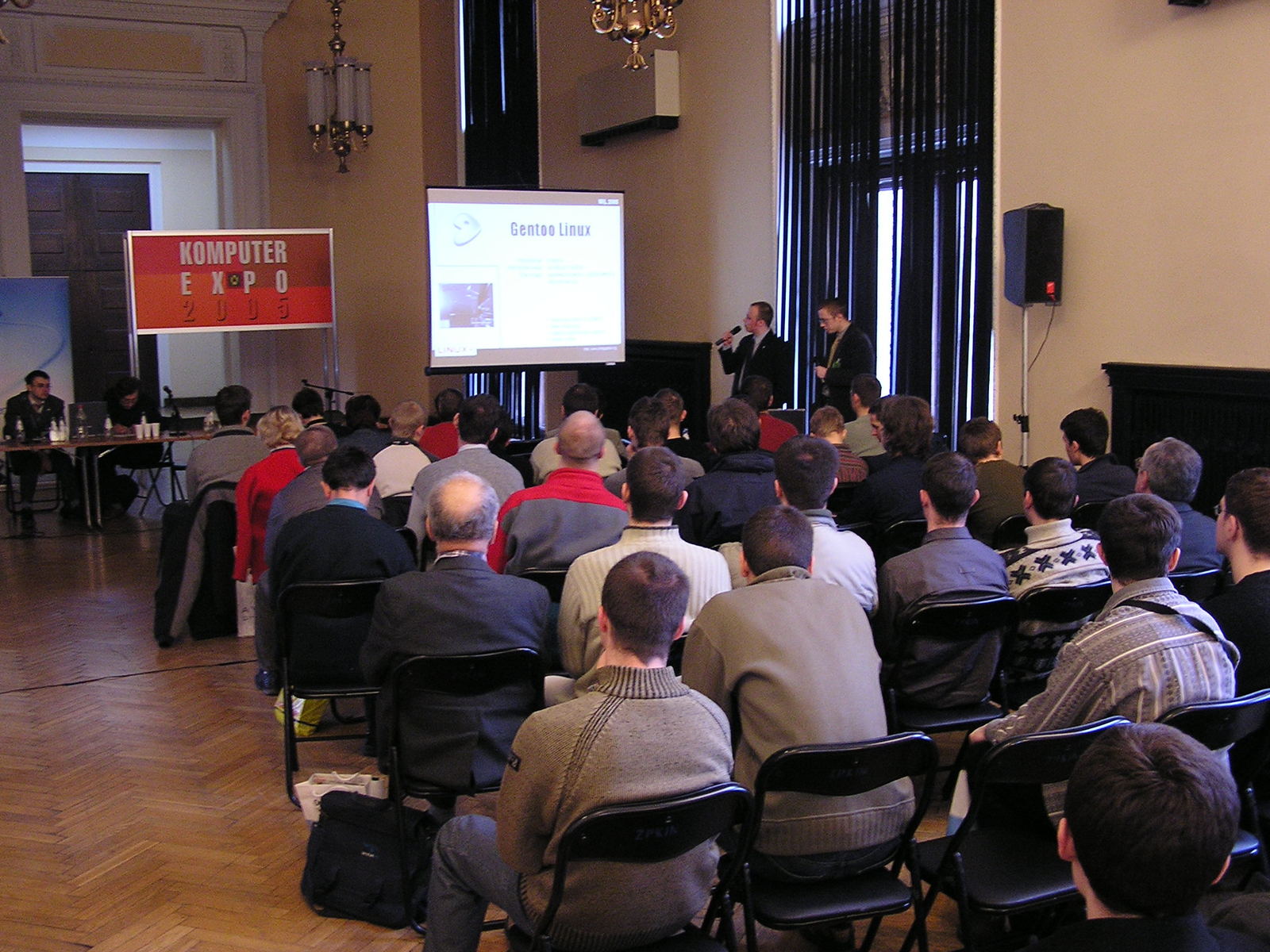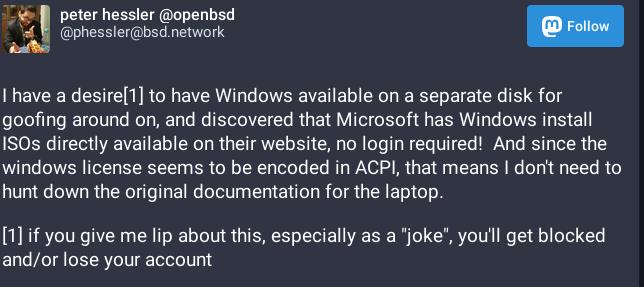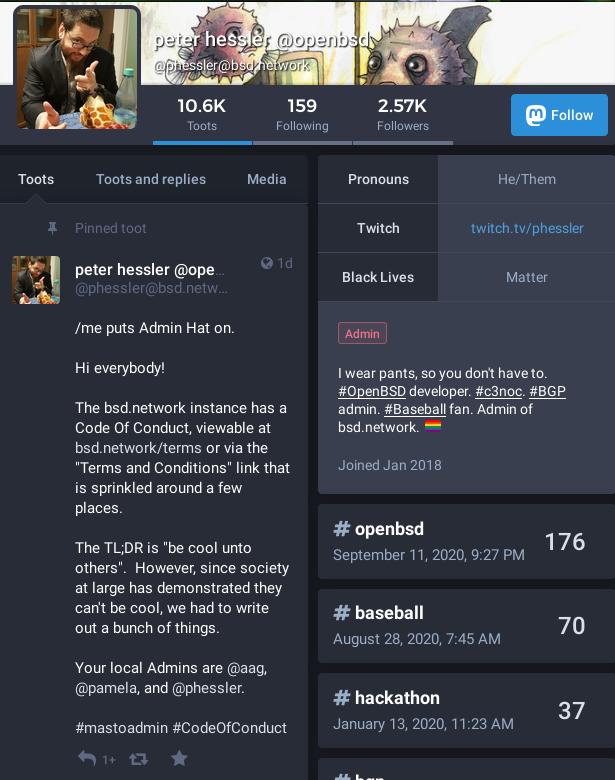

THERE is this old and pseudo-philosophical conundrum about free speech in general, e.g. tolerating the intolerant. Or questions like, are we tolerant for not tolerating speech that we perceive to be inherently intolerant?
"Having received about 40,000 comments in this blog, there are many that I strongly dislike; but we never censored comments, not even ones with racial slurs in them."The subject isn't new. The debate isn't unprecedented. There are, however, things that can be said in the context of free-as-in-freedom software.
Free speech absolutists have to be quite tolerant (and no, we're not talking about nazis who disguise themselves as "free speech") because they need to not necessarily respect but let words be spoken/written/published despite loathing those words. Cultural differences too are a factor.
Having received about 40,000 comments in this blog, there are many that I strongly dislike; but we never censored comments, not even ones with racial slurs in them. Those are just a reflection of what society is and we draw the line at physical threats (those are a special case and there are well-established laws for dealing with them, even restraining orders and arrests).
 Yesterday in IRC someone brought up Gab; well, Gab isn't an ordinary site because there are many violent cults there, ones that seek to implement ethnic cleansing and death threats are commonplace there. So put Gab aside as a special case. What's special about it isn't mere racial/ethnic agitation but its uniquely violent nature (including members proceeding to mass murder, based on things that inspired them in Gab, legitimising those acts). The management of Gab obviously does not condone such violence and it cooperated with authorities when it had to; but those who block Gab (e.g. Fediverse factions) have some legitimate grounds for doing so, noting the large proportion of violent (in nature, explicitly) output emitted from there.
Yesterday in IRC someone brought up Gab; well, Gab isn't an ordinary site because there are many violent cults there, ones that seek to implement ethnic cleansing and death threats are commonplace there. So put Gab aside as a special case. What's special about it isn't mere racial/ethnic agitation but its uniquely violent nature (including members proceeding to mass murder, based on things that inspired them in Gab, legitimising those acts). The management of Gab obviously does not condone such violence and it cooperated with authorities when it had to; but those who block Gab (e.g. Fediverse factions) have some legitimate grounds for doing so, noting the large proportion of violent (in nature, explicitly) output emitted from there.
So again, just to clarify, when we speak about free speech we do not include (within scope) every single utterance of nonsense, especially not calls for genocide. There have long been laws for dealing with these, aside from the realms of speech alone (many murders are preceded by threats, whether it's domestic violence or disputes over drugs; there's an interest in prevention of lethal/fatal violence).
Some hours ago Derek Taylor (also known as DistroTube) published this video/view entitled "If You Support Free Software, You Should Support Gun Rights" (similar to the sorts of things ESR likes to say) and last week he published a video that uses words like "virtue-signalling", "social justice warriors" etc. (coming across like part of a group that's widely perceived to be intolerant). I've spoken Derek Taylor online but not offline (he's in the US, very far from here) and I largely agree with him on many technical things (I strongly disagree with his older stance regarding Torvalds and Stallman -- a stance he may have changed since). But in Daily Links there's no reason not to include this "pro-gun" video, even if many of us do not share his views. The feature image for that video is of him holding a rifle. Stay classy, eh?
It's truly regretful that, putting "wings" aside (the political duality -- a superficial binary standard), a certain polarity in the Free software world now deems people or classifies people as either "left" or "right" (some go further and simplify with "anti-Trump" or "pro-Trump"). This is partly the reason why ESR, both co-founder of the OSI and for a period of time chief of the OSI, got banned by the OSI earlier this year ('canceled' from mailing lists, at least). His views on Free software -- oh, sorry... Open Source -- licensing did not seem to matter because his choice of words seemed political on the 'wrong' side of politics. This isn't the way to have an healthy and productive debate about software and ethical issues. Sure, we don't all agree about politics. And if ESR thinks that there's "vulgar" form of "Marxism" somewhere, let him say it. One doesn't have to agree with him. To outright ban him (from his own creation) says a lot about the lack of will to come up with a counter-argument. This is to be expected somewhere like China. Do we really wish to go down this route?
What I find a lot more concerning, personally at least, is censorship of people not for the 'wrong' political worldviews (the people who suffer the most from it call it 'wrongthink' or similar terms) but for criticising bad corporations. Here's an example that is very new and very disturbing:

Language of dictators: "if you give me lip about this, especially as a "joke", you'll get blocked and/or lose your account" (and he's not joking! Not tongue-in-cheek a statement!)
As an associate of ours put it: "In the bsd.network link [...] we see what CoCs are really about."
We recently saw the same thing in Rust/Mozilla/Reddit (banning Microsoft critics).
In an act of recognition and solidarity we recently reproduced many articles from Daniel Pocock, whom I believe got in trouble for doing 'too much' complaining about corporate influence if not takeover by large corporations such as Google and Microsoft (both pay Debian and the FSFE) -- two companies which his technical work (SIP etc.) seeks to make obsolete.
Dig a little deeper into the context of the above quip/toot and find this (pinned even):

So the CoC seems to have been magically extended to, "do not criticise Microsoft" (an OpenBSD sponsor by the way; this is no secret). Do we want to go down this route of making it impermissible to criticise large corporations and oligarchs, especially those who pay us? If so, isn't that just bribery for silence? Are we enforcing politeness here or merely covering up misconduct and censorious behaviour? ⬆
Comments
Canta
2020-09-22 17:56:48
Here's my problem right now with free speech, which is the same as with telemetry: hegemony and power dynamics. There's no counter-argument when your voice is but a small and barely perceivable noise in the middle of a thunderstorm. You're free to tell whatever you want, alright: but there's no debate either, and thus no possible shift in rationale towards your posture, and so your freedom doesn't have the same value as the freedom of people with hegemonic discourses.
If you said something like that about 30 or even 15 years ago, it was one thing. But this is no longer theorerical: this is what previously happened with concentrated media, and happens right now in social networks; this is dissinformation, polarization, and masses taking arguments from economic elites. Freedom of speech CAN and IS BEING manipulated. And the consequences are a complete disaster worlwide.
It's a serious and unsolved problem. I like to use comparisons to get the things in perspective. And thus I compare freedom of speech as an issue with prostitution, for example. There is a never ending debate there between abolicionist (people saying that prostitution should be banned), and legalizationists (people telling that prostitution should be regulated, granting sane working conditions, as any other jobs). And if those were the terms, I'll go blindly towards legalization, because I vow for freedom. However, prostitution involves the sex slavery networks, and legalization does not provide enough tools to deal with that issue: more likely it even acts as an enabler. And so I seriously consider abolition, even when I don't believe in abolition. Freedom of speech has exactly the same issues, every passing day less and less hypothetical.
It's about material, real, contextes.
I frankly couldn't care less about the legality of violent discourse, or even threats: I would just answer "fuck you", threat the idiot back, and call the police if I believe the thing to be serious. So, if it were for me, that's not a line where to draw censorship. I also love edgy humour: I find funny stuff that other people get shocked from, and thus I would happily defend any moron being an ass while posting gore or racism or whatever if it make me laugh. But the point is that freedom is not about me but about everybody at the same time: and things like panic attack trigering, hate mobs, social manipulation, conflict, fights, murders, suicides, are very real things happening right now because of how people deals with what other people say. So, in a context like that, I can't just naively say "freedom", and I do understand different communities having different criteria for censorships: at the very least, I understand a need for CoCs. Naive freedom didn't ended well in my experiences.
Today, I believe a sane solution to this problems may be in care ethics.
I also believe in heterogeneity: different communities with different rules, so I can tell edgy jokes there, and speak differently here. That's also an argument for anonimity. But that implies rules, which clearly implies degrees of censorship.
Of course, this I say is not what you say, which is most likely the inverse: "censorship is also a tool for all of that". I concede that. But my point is that it's just not that simple as "defending freedom", but more close to negotiating its limits.
I'm an freedom absolutist when it comes to speech in sciences. Today, I prefer to be a little less absolutist when dealing with politics.